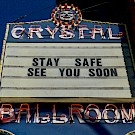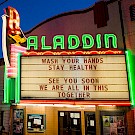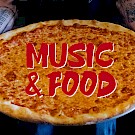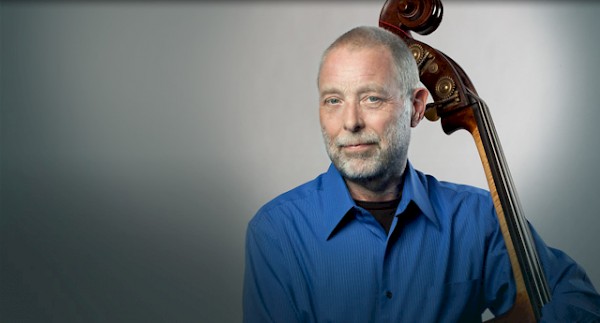 After five decades, 40-plus albums as a bandleader, and nearly double that number as a sideman, Dave Holland is still making music that matters. Once termed “possibly the most accomplished pure jazz composer among bassists after Charles Mingus,” Holland, a soft-spoken Englishman who rose to international prominence with Miles Davis’ early-1970s Bitches Brew-era group, also appears—in perhaps an equally impressive feat—to have mastered the collaborative dynamics and mechanisms so often underlying it. An unquestionably gifted and prolific musical talent, he appears an equally blessed facilitator in ensemble settings, deftly underpinning his bandmates’ prodigious gifts while never losing sight of, or over-asserting, his own.
After five decades, 40-plus albums as a bandleader, and nearly double that number as a sideman, Dave Holland is still making music that matters. Once termed “possibly the most accomplished pure jazz composer among bassists after Charles Mingus,” Holland, a soft-spoken Englishman who rose to international prominence with Miles Davis’ early-1970s Bitches Brew-era group, also appears—in perhaps an equally impressive feat—to have mastered the collaborative dynamics and mechanisms so often underlying it. An unquestionably gifted and prolific musical talent, he appears an equally blessed facilitator in ensemble settings, deftly underpinning his bandmates’ prodigious gifts while never losing sight of, or over-asserting, his own.
Like Davis, who sought Holland for Filles de Kilimanjaro and In a Silent Way, the 70-year-old has also maintained a consistent eye for collaborative talent, having performed and recorded with the likes of Herbie Hancock, Chick Corea and Pat Metheny, as well as the present generation’s brightest stars, including saxophonist Chris Potter and drummer Eric Harland. In fact, some of Holland’s most compelling work, such as 1999’s Prime Directive and 2001’s Not for Nothin’, has been released in more recent decades, lending credence to the apropos compositional progressivism and broad musicianship for which he is often, rightfully, credited.
On Aziza, his October 2016 release, Holland joins forces with Harland and Potter once more, having already played with both in separate groups, and with guitarist Lionel Loueke, a Beninese guitar virtuoso who brings both hearty contemporary jazz chops and a distinct twist of African folk to the session. Adopting a collective approach honed over a series of summer 2015 performance dates, Aziza showcases a colorful and thoughtfully sequenced selection of songs, ranging from the funk-inflected groove of opener “Aziza Dance” and Afrobeat of “Summer 15,” to the spaciousness and measured lyricism of “Friends.” And as seems typical for a Holland session, each musician remains conscious of and carefully responsive to one another, making for a lesson in musical dialogue and generous accompaniment, both in what to play and what not to play.
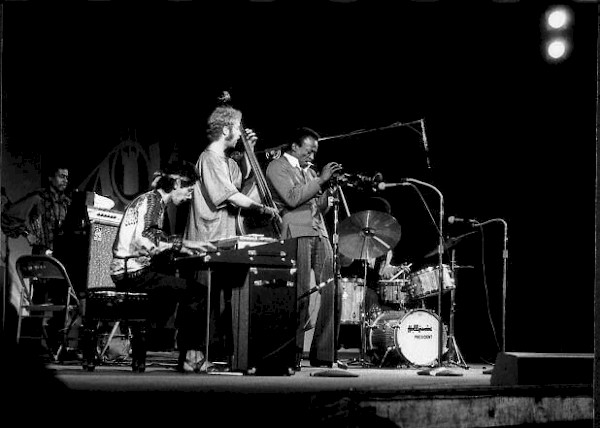 Dave Holland with Miles Davis, Chick Corea, Jack DeJohnette and Wayne ShorterDave Holland will be performing with Harland, Potter and former Tonight Show guitarist and bandleader Kevin Eubanks at Portland’s Revolution Hall on Friday, April 7. Interviewed in advance of this appearance, Holland talks Indian jazz and performing with tabla master Zakir Hussain, as well as the origins of the Aziza group. He also speaks on group dynamics, closing with reflections on the importance of listening, and, for aspiring musicians, the simple—but paramount—need to just get out and play.
Dave Holland with Miles Davis, Chick Corea, Jack DeJohnette and Wayne ShorterDave Holland will be performing with Harland, Potter and former Tonight Show guitarist and bandleader Kevin Eubanks at Portland’s Revolution Hall on Friday, April 7. Interviewed in advance of this appearance, Holland talks Indian jazz and performing with tabla master Zakir Hussain, as well as the origins of the Aziza group. He also speaks on group dynamics, closing with reflections on the importance of listening, and, for aspiring musicians, the simple—but paramount—need to just get out and play.
I understand you recently played with a group of Indian musicians, including Zakir Hussain, who I remember from the Remember Shakti records with John McLaughlin. Is there something of a jazz movement taking place in India now?
Well, it’s musicians who were inspired by what they’ve heard of the jazz community. And it’s a small scene in India. You know, there’s not a huge scene in India, but there are some very dedicated players. And they love the music, and they play really, really well.
They also come up through the Indian tradition, so there’s elements of that, as well. One of the musicians is an amazing vocalist named Shankar Mahadevan, who is very, very admired and appreciated—particularly in India. He sings in the Carnatic tradition, and he does a lot of other things, too. He’s acted in Bollywood movies, and he’s had a lot of hit records and so on—more commercial Indian music. But he’s also an incredible classical singer as well, so he’s involved with the project.
Are there any other figures in that scene who people should know about?
I don’t know! I’m just beginning to learn myself. These are musicians who are new to me. There seems to be a very dedicated group—small, but dedicated. Some of them come to America. We had a jam session one night in Mumbai, and there were several musicians who were there who had come to America and played here. Some were even living here. So, jazz has inspired people all over the world.
It’s always been an inclusive music. It’s embraced lots of diverse influences over the years. Obviously, it started in the African American community and obviously still has a big part of that culture in the music, here in America. But it has reached out across the world, and people from all parts of the world are inspired by it, and, in some cases, have mixed elements of their own music in with the jazz improvisation.
You know, the great thing about Indian music and jazz is that they’re both improvised forms. So, there’s a lot of things they have in common, in terms of developing improvisation.
I didn’t know that a lot of Indian music was improvised.
Yeah, they have structures—melodies and ragas and rhythmic cycles—that they work with and different songs. A large part of any classical Indian performance is improvisation.
But, I think the world’s getting smaller, and music’s bringing the world together—hopefully. We need some of that, don’t we? [Laughs]
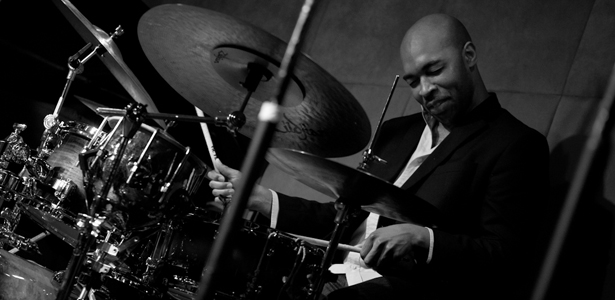 Eric HarlandThat’s an understatement. I was wondering if you could talk about Aziza a little bit; how you approached the album and any musical characteristics you were looking to emphasize.
Eric HarlandThat’s an understatement. I was wondering if you could talk about Aziza a little bit; how you approached the album and any musical characteristics you were looking to emphasize.
Aziza came together about a year and a half ago, or something like that. It was two summers ago. We wanted to put a band together. Chris Potter and I were talking about doing something that year, and we were just discussing some ideas for who we would like to play with. And Eric [Harland] is one of our favorites, so that was pretty easy. Chris suggested Lionel [Loueke], and I thought that was was a wonderful idea.
We had played with Lionel in a variety of situations. We had all known each other and played with each other, but never in this combination of four musicians. We’ve just worked in different circumstances. Lionel and Eric played in Terence Blanchard’s band, and Chris and I have been playing together. So the connections were there, and that sort of set the groundwork for what we were doing. And we just decided to make a collective group out of the four musicians, and each of us brought some music into the rehearsal, which is when we started working on the music. We went out on tour that summer, and during the tour, we decided we’d like to record the band, and the music was developed and was ready to be recorded. A few weeks after the tour, we went into the studio.
You’ve said that, when possible, you try to perform with a group before recording. Has that always been your approach?
It has with my records, anyway. Every record I’ve done as a leader, has been done through a process of playing the music first on the road and going into the studio and recording.
As a bandleader, do you normally look to create something of a collective—where each member of the group prepares original material—the way you did with Aziza?
Yeah, I do. I feel like it’s a very democratic situation on the bandstand. We’re sharing space together and we’re creating the music together. And if there are composers in the band, it’s always nice to get their perspective on the setting for the music that a particular group can play and broaden out the scope of what we can do. That’s something that I’ve always enjoyed doing in the bands I’ve led, and in the collective group for Aziza.
You know, everybody’s very active composing and all the pieces really fit together well, I thought. We obviously had some common thoughts about what the band would sound like, and what sort of thing would suit the group. That became evident as we started rehearsing the music.
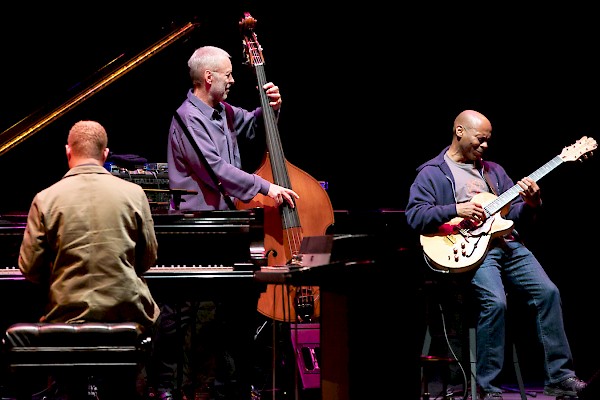 Dave Holland with Kevin EubanksI saw that Kevin Eubanks is scheduled to play the Portland show with you guys. Have you been able to get a feel for how his presence bears on the overall dynamic of the group—with you, Chris and Eric—and what some of his strengths are relative to that?
Dave Holland with Kevin EubanksI saw that Kevin Eubanks is scheduled to play the Portland show with you guys. Have you been able to get a feel for how his presence bears on the overall dynamic of the group—with you, Chris and Eric—and what some of his strengths are relative to that?
Well, we’re playing different music. This is not the Aziza group playing in Portland with a substitute for Lionel. And I think there’s been some confusion about that, just because there’s three of the members of the Aziza group. But we have a different set of music we’re playing with that band, to suit that band. Kevin’s written some music for it, I have, Chris has, and that’s what we’ll be playing in Portland.
Oh, interesting. Has that group been playing together for a long time?
Yeah, we’ve done some gigs together. We did some gigs in Europe with Chris, and I’ve been working in a trio with Kevin—either with Eric on drums, or with Ben Calvert, another fine drummer. So we have some music we’ve been developing as a trio.
Chris joined us last year for a few gigs. We did a few gigs in Europe, and we did a week at Birdland in December last year, with Chris. Calvert was on drums, and Kevin was there, too. So, that’s what we’ll be playing on the West Coast for this swing.
Has the music been drawn from stuff you guys have all recorded, or is the group performing new material?
There’s some new things, and maybe one or two songs that Kevin and I have done. There’s one piece of Chris’ that I think I played with him in a duo situation a while ago. So, yeah, it’s a mixture of things—some new [and others] that’ll sound new because it’s other people playing them. [Laughs]
Right. It changes night to night.
Exactly.
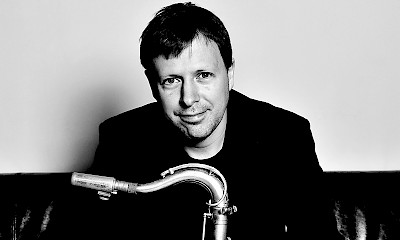 Chris PotterWhen you’re working with players on the level of Chris Potter, Eric Harland and Kevin Eubanks, how do you approach fitting in with them? Is it difficult to find a place for yourself? Or do musicians of that order usually do a good job of leaving space for each other?
Chris PotterWhen you’re working with players on the level of Chris Potter, Eric Harland and Kevin Eubanks, how do you approach fitting in with them? Is it difficult to find a place for yourself? Or do musicians of that order usually do a good job of leaving space for each other?
Well, you know, when you have empathy between the musicians, everybody finds a relationship in the music to make it work. And that’s what we’re focused on: creating the best music out of the group. And as long as you’re with musicians like that, it makes it easy.
In most situations, does it normally fall to a bandleader to make sure everyone stays in their place, or is that simply a hallmark of an elite musician?
I think the less you have to be a bandleader, the better, and finding the right musicians is the key to it. And in a situation where you are the bandleader, some decisions about what material might be—you might set the tone or the direction the band is going in a little bit.
But, as I said, I think that if you’ve got the right musicians—if everybody’s mature and responsible and taking care of their areas of the music—then not a whole lot needs to be said.
You’ve said that listening is as important a skill as playing, and that really struck me. Can you expand on that concept a little bit?
Yeah, well that’s the other side to playing music: listening. I think the best players, for me, to play with, are the ones who are good listeners as well, and who can really embrace what is going on in the music and add to it, and feed it, and respond to it. And that all takes a good listener to be able to do.
It’s a conversation. It’s like, if you just relate to how you’re talking to a friend, some people are easy to talk to. You say something, and they’ll wait while you say something. And there are other people who just keep talking, and you can’t get a word in! [Laughs] And that’s not the way I want to play. The music I want to play is where there’s a back and forth dialogue, a conversation, or a call and response—all of these things.
Have you found listening to be an innate skill, or is it something that’s learned?
Well, you’ve got to learn how to listen. Yeah, of course. Because listening is like looking; you only see the things that you recognize and that you look for.
There’s been a lot of tests like that with observation. Something that’s really obvious, like an elephant in the room—I’m exaggerating—but if you’re not looking for an elephant in the room, you don’t see it.
We’re constantly listening or seeing things through a filter, which is our consciousness, and which allows us to see some things and not others just because our attention isn’t on them. So listening is a part of that. You learn to broaden your ability to listen and to be able to hear more than one thing at a time, for instance.
I can imagine that being a bit overwhelming at first—especially if you were a younger player sitting in with much more experienced musicians and trying to perform jazz, which is difficult to begin with.
I think it’s just a gradual thing that you grow into. And the other side of it is, of course, playing your own ideas at the same time. So it’s a process where you’re listening, but also initiating. It’s not quite like a conversation, because we’re saying things at the exact same time in the music and complementing each other. It’s a different kind of awareness of what’s going on in the music.
When you were making your way as a younger player, did you find that a lot of older and more skilled musicians you worked with were accepting of that process?
Well, I think that any musician who’s honest has been through the process themselves. We’ve all been in that place where we’re just starting out and learning and didn’t know a whole lot. And, if you’re lucky, you’re around people who are generous enough to share their information with you, and teach you, and show you, and tolerate your mistakes, and so on. [Laughs] That’s part of passing on the tradition, you know?
I think Coleman Hawkins said that “If you don’t make mistakes, then you’re not really trying.” There’s been a lot of quotes along those lines in interviews with great musicians like Charlie Parker and John Coltrane and Sonny Rollins. They’re all talking about growing still, even though the interviews might have been from another stage where they’ve done everything they could want to do, you know? But they’re still talking about how there’s more to be done, and “If I could just get to this, then I could do that.”
And that reality, I think, helps you be open enough to grow, and to learn, and also to help other people.

